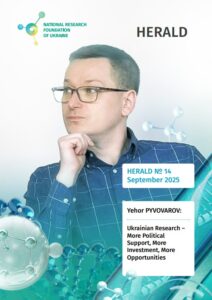
During wartime, the support of allies and international partners is invaluable for Ukraine. International cooperation and solidarity are particularly important for researchers. 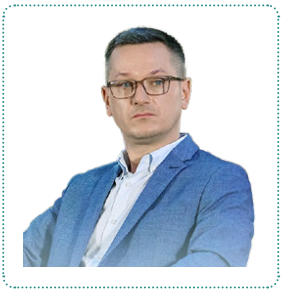 Has the number of applications and successful projects by Ukrainian researchers in Horizon Europe calls increased in recent years? How does Ukrainian participation in European calls impact European science? What opportunities for Ukrainian researchers and innovators are opened by the establishment of the International Coalition for Science, Research, and Innovation in Ukraine? We asked Policy Officer for Research and Innovation at the EU Delegation to Ukraine, Yehor Pyvovarov, to answer these and other questions.
Has the number of applications and successful projects by Ukrainian researchers in Horizon Europe calls increased in recent years? How does Ukrainian participation in European calls impact European science? What opportunities for Ukrainian researchers and innovators are opened by the establishment of the International Coalition for Science, Research, and Innovation in Ukraine? We asked Policy Officer for Research and Innovation at the EU Delegation to Ukraine, Yehor Pyvovarov, to answer these and other questions.
– Mr. Pyvovarov, could you please tell us about your professional career? How did you come to work at the EU Delegation to Ukraine, and how did science, research, and innovation become the focus of your work?
– After graduation from university, I worked for many years in public service, specifically in diplomacy. I served for nearly fifteen years at the Ministry of Foreign Affairs of Ukraine, in particular at the Department of International Security. I had the unique opportunity to be at the origins of shaping Ukraine’s state policy in the field of cybersecurity and combating cybercrime. I served as coordinator of Ukraine’s interagency group during numerous bilateral political consultations with foreign partners. These consultations focused on strengthening Ukraine’s cyber defence after russian cyberattacks on our critical infrastructure in 2016-2017, sharing practical experience, and developing relevant strategic documents.
I also had an honour to represent our country at many international platforms where innovative approaches on digital security were among the national priorities of Western states.
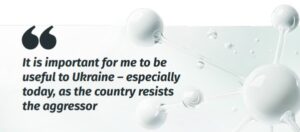
It was during this period that I became firmly convinced: without development of research and an innovation-driven mindset, no country can claim a respected place in the world amid a shifting geopolitical landscape and extremely complex challenges and threats. Of course, this is equally relevant for Ukraine.
After completing my diplomatic service at the Ministry of Foreign Affairs of Ukraine, I joined several EU programs in the field of research and innovation. It is important for me to be useful to Ukraine – especially today, as the country resists the aggressor.
In July 2024, I returned to Kyiv and began working as Policy Officer for Research and Innovation at the EU Delegation to Ukraine. This was a newly established position under the auspices of the European Commission’s Directorate-General for Research and Innovation (DG RTD).
– In 2021-2022, you served as Chargé d’Affaires of Ukraine in the Kingdom of Belgium and the Grand Duchy of Luxembourg. How did your experience in Belgium and Luxembourg shape your understanding of European approaches to research and innovation?
– Yes, indeed – at the time of russia’s full-scale invasion of Ukraine, I was Chargé d’Affaires, actually Acting Head of the diplomatic mission. It was an important experience, despite the enormous challenges we faced in the early days of the war. We worked in a small Embassy of a state that had been attacked by a neighbouring country …
We held numerous negotiations with the governments of Belgium and Luxembourg, both of which stood in support of our country. This gave me the opportunity to see from the inside how the national security systems of these states operate, to understand their priorities in science, and to appreciate the scale of their investments in research.
Both Belgium and Luxembourg have relatively small armed forces, yet they are strong in technology, digitalization, and innovative approaches and solutions that influence the EU and NATO security policy.
I have great respect for Luxembourg which serves as an example of competent and effective governance in the field of research and innovation. This wealthy and highly developed country has deliberately fostered a unique economic and investment climate for science to attract the world’s best researchers. I recall Luxembourg’s Prime Minister Xavier Bettel once telling me: “We are a very small country, but our greatness and role in the world will never be limited by our territory. We strive to be a leading state where technology allows us to see the day after tomorrow.”
For this reason, this country can serve as a valuable example for Ukraine. The issue is not merely financial, but rather understanding that the future – particularly economic growth and security – directly depends on research and innovation. The policies and strategies of the entire European Union are based on the same principle.
– In December 2023, the Horizon Europe Office in Ukraine was launched on the basis of the National Research Foundation of Ukraine. Its staff provide guidance to National Contact Points, researchers, scholars, and other stakeholders on the specifics of the Horizon Europe Programme. Currently, it is the only HEO fully funded by the European Commission. What arguments were decisive for the EC in making the decision to open the Office?
– The launch of the Horizon Europe Office in Ukraine has become, first and foremost, a recognition of the potential of Ukrainian researchers and of Ukrainian science as a whole. For the EU, Ukraine, despite its internal transformational challenges, remains a country with substantial industrial and research capacity.
For many years after the collapse of the USSR, science in Ukraine has been in survival mode and its significance (as well as the one of innovations) is only now being recognised by government officials and politicians. Paradoxically, it was the war made us appreciate those who, despite shelling and destruction, continue perform research, in particular for defence needs. I hope this new understanding will help create proper conditions for the development of science in Ukraine.
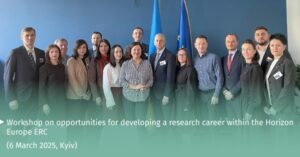
These conditions are created thanks to political and financial support from the EU which is the largest donor to Ukraine in wartime. Science is included in the list of sectors that are critically important for Ukraine, on a par with defence, economic stability, reforms and the fight against corruption.
The launch of the HEO and the extension of its mandate send a clear message: the EC wishes to see Ukraine as a strong European state that will contribute to innovation growth, prosperity, and sustainable development across the whole of Europe.
Moreover, the results achieved during the HEO’s first term were highly significant. This has become a strong argument to extend its work.
– Recently, during the round table “Activation of Ukraine’s participation in the EU Framework Programme for Research and Innovation Horizon Europe”, you noted that the European Commission closely examines and evaluates the activities of the HEO in Ukraine as the Programme Coordination Centre, the NCPs network and programme committees. Have you seen any changes over the past two years in the number of applications (and successful projects) by Ukrainian researchers in Horizon Europe calls?
– Changes are certainly evident. The growing number of applications demonstrates the Office’s successful awareness-raising efforts, which are steadily gaining momentum. I follow the process closely, participate in almost every event organised by the HEO’s team, and I can confidently say that if this momentum continues, the number of applications from Ukrainians in the Horizon Europe Programme will keep increasing.
I believe we should give a real boost to the NCPs’ work – Ukraine cannot afford a slow start; we need to deliver results immediately. I will be drawing attention to this of the Ministry of Education and Science of Ukraine, the HEO, and the NCPs themselves, as they are a vital link for engaging regional research communities in the opportunities offered by the HEO.
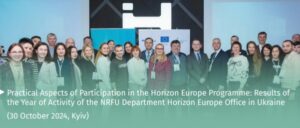
– In your opinion, what needs to be done to increase the success rate of applications?
– Strengthening the work of the NCPs is the key to promoting the HEO’s opportunities in the regions. The HEO chose the right tactics of organising off-site workshops and engaging local academic circles. The level of interest from universities and researchers across different regions of Ukraine is genuinely high, I have seen it firsthand.
In my view, it is necessary to deepen researchers’ understanding of the rules for preparing grant applications. This truly matters, since talented researchers can easily get lost in the Programme’s procedures without expert guidance. Knowledge of English is also a significant factor. The number of researchers learning English is increasing, but it is desirable that the speed of learning a foreign language be much higher.
And most importantly – motivation. We must inspire scholars and researchers to test themselves in the Programme. It is no secret that many do not see the point in applying for grant funding. We must change this mindset and convince them to take part in Horizon Europe calls. It is worth it.
– How would you assess the cooperation between the EU Delegation and the NRFU within the framework of this project?
– I hold it in very high regard. I am grateful to the entire Foundation team and personally to the Executive Directorof the NRFU Olga Polotska for clear understanding that Ukrainian research must be an integral part of the European research community.
I can see the scope of the Foundation’s work, even considering institutional challenges and bureaucratic constraints. Our international partners know this as well. They are initiating new joint calls and projects that shows that the NRFU has a good reputation among European and global researchers.
The Delegation will continue to support the Foundation in ‘staying the course during the storm’. We will ensure that the NRFU maintains its autonomy and continues to carry out its legally mandated functions effectively.
– Two or three years ago, it was common to hear from the research community that many researchers felt lost in complex terms and conditions of Horizon Europe calls, and that at the national level there was a need for a training course in ‘Horizon Studies’. In your view, has this sense of confusion decreased?
– I can confirm that it has indeed decreased, largely thanks to the work of the HEO. Any potential grantee can request individual consultations from the HEO or simply access its online resources which are highly informative and well-structured.

– Ukrainian researchers note that research institutions and universities that submit grant applications and cooperate with foreign partners are experiencing active development. Do you observe the reverse process as well? How does the participation of Ukrainians in European calls impact European research and the research community?
– It is indeed mutually beneficial for both foreign partners and Ukrainian researchers. It is precisely the exchange of experience that drives science forward. In today’s world, being cut off from global science means ending up in a vacuum with no room for growth. That is why the EU is actively contributing to Ukraine’s integration not only into the Horizon Europe but also to its access to the unique opportunities from the ERA – the European Research Area. Its goal is to make science a driver of sustainable economic growth of the continent and to create an effective Single Market. Ukraine has already begun moving in this direction.
– As we know, Ukraine and the EU have completed the screening of Ukrainian legislation for compliance with the EU law under Negotiating Chapter 25: “Science and Research”. Ukraine is gradually moving toward European integration and eventual EU membership. How would you assess the speed of this progress specifically in terms of aligning laws in the research field?
– The assessment of Chapter 25 did not raise serious concerns (compared to other, more ‘sensitive’ chapters). According to the European Commission, this area is developing, though the pace could be faster.
Of course, when assessing Ukraine’s progress, we take into account the realities of war. We note that substantial work has been done to strengthen the role of research and innovation within the state’s system of priorities. The main thing is that the state is gradually refocusing on science. Ukraine’s victory in this high-tech war will depends on whether the state can engage innovators and researchers in finding solutions that will ensure a strong response to the enemy.
This is impossible without legislative amendments and the removal of outdated post-Soviet regulations that hinder progress. Several draft laws are currently under consideration in parliament that are supposed to improve the rules in research and bring them closer to global standards. The European side realize the specifics of adopting laws during wartime and the priorities of national security, so it will continue the dialogue with the Government and parliament. Draft laws in the field of research must not get lost among others, nor can they be postponed for better times.
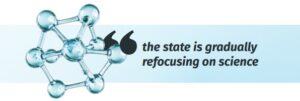
I believe that the relevant parliamentary committee and the Government realize this and will continue working to ensure these documents are adopted and implemented on time.
Without them, Ukraine’s European integration could face additional obstacles.
– In July, at the Ukraine Recovery Conference 2025 in Rome, the launch of the International Coalition for Science, Research and Innovation was announced. What opportunities will this initiative provide for Ukrainian researchers and innovators? From which sources is it planned to attract funds for Ukrainian research?
– This important event took place on July 10 in Rome. The initiative came from the European Commission within the framework of the G7, following long and complex negotiations. Its aim is to create a coalition of countries that will financially support the rebuilding of Ukraine’s research infrastructure destroyed by the aggressor and contribute to the renewal of the technical and material base of research institutions.
The Coalition Agreement is based on UNESCO’s Action Plan which carried out a detailed assessment of the war’s impact on Ukrainian science and calculated the financial and material losses. The plan sets out a specific timetable for the next 10 years regarding the steps that the international community will take to help Ukraine overcome the consequences of the war.

Funding for the Coalition’s initiatives will come from a dedicated budget formed through contributions from member states and private businesses. Large corporations and patrons may also join in forming this budget. It is not excluded that part of the funds from the foreign assets of the aggressor state may also replenish the Coalition’s fund; partners are currently seeking legal mechanisms to make this possible.
The establishment of the Coalition is indeed a landmark event for supporting Ukrainian science. The EC and the G7 have effectively recognized science as a distinct priority requiring special attention during Ukraine’s post-war recovery. This means more political support, more investment, and more opportunities for research and researchers.
Interviewed by Svitlana Galata

